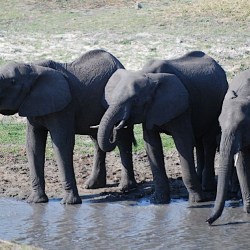News
We bring you the latest from around the World in wildlife and conservation news.
The Great Elephant Census To Begin This Year
Elephants Without Borders is undertaking a 2 year long census that will survey elephants and began last month.The survey is the largest pan African aerial census of elephants since the 1970’s and is being calls the Great Elephant Census. The results are expected to provide important information that will be crucial for the future survival of the species. It is expected to return information such as population statistics and geographic range all of which will go a long way to helping conservation efforts.
London Hosts Conference On Illegal Wildlife Trade
Last month British Prime Minister David Cameron hosted a summit in London that was designed to fight against the illegal wildlife trade globally.50 heads of state attended from some of the worst affected countries. It is estimated the illegal wildlife trade is worth approximately £11.5 billion per year.Rhino poaching reached record levels last year according to the Save the Rhino charity. In 2013 1,004 rhino’s were lost to poaching in South Africa alone. In 2014 86 Rhino deaths have been recorded in South Africa so far. The level of Rhino poaching globally has risen an astonishing 7,500 per cent between 2007 and 2013 and it is estimated that once every ten hours a Rhino is killed by a poacher.
Illegal Rhino Poaching Hits Record In 2013
Last year was the worst year on record for rhinos that were killed by poachers according to new data released by the government of South Africa. There were approximately three rhinos killed each day representing an increase of an astonishing 7,723 per cent.To get a sense how bad things have become in 2007 just 13 rhinos were poached and in 2013 that figure reached 1004. The Kruger National Park was one of the worst affected.
Conservationists Using Drone Technology In Fight Against Poaching
Conservationists in Africa have begun introducing drone technology in Africa to help park rangers get a leg up against poachers in regions where rhino’s and elephants roam and are vulnerable.About a year ago, Google donated US$5 million to the WWF to search for new ways to deter and detect wildlife crime.Conservationists in Namibia are about to start a drone program combined with a variety of other tracking technologies in some of the country’s national parks according to WWF officials.
Why The Tiger Is Not Native To Africa
If you are visiting Africa on a safari and run into a tiger then that is definitely something to tell your friends. The reason for this is because tigers do not live in the wild in Africa, however if your are very lucky you may actually see one.Tigers, lions and leopards come from the same family of cats called Felidae. This family can traces its origins back to a common ancestor in Africa. Experts believe that roughly 2 million years ago one offshoot of the Felidae began to migrate towards Asia and evolved into the tiger we know today. Once this species established itself in Asia they never returned to Africa though experts have no idea exactly why this happens to be the case.
How To Tell The Difference Between African And Asian Elephants
To the layperson, the Asian and African elephants can seem indistinguishable; however there are some key physical differences that make it relatively easy to tell the two species apart.According to the Elephant Sanctuary the key differences can be seen in the head shapes, tusks and ears. African elephants have much bigger ears which are actually shaped in a similar manner to the continent of Africa. African elephants need large ears to help keep them cool in the blazing African sun. In contrast Asian elephants do not have to worry about heat so much because they tend to live in jungle areas which are much cooler and this of course makes their ears smaller.
China Destroys Illegal Ivory Stockpile
A couple of months ago the United States destroyed its stockpile of illegal ivory for the first time in over two decades of making seizures. China did the same at the beginning of January destroying a stockpile of its own ivory that the government had confiscated alongside other illegal wildlife products.
Leonardo DiCaprio Makes Big Donation For Tiger Conservation
Hollywood actor Leonardo DiCapro has donated $3 million to the WWF through his foundation. The money is meant to help Nepal achieve a 100 per cent increase in its tiger population by 2022 which is officially the next year of the tiger.The money will be used for improving anti poaching efforts that will protect areas where tigers are known to breed. Funds will also be used to restore some important corridors for tiger expansions and continuing the monitoring of the tiger population in the Terai Arc region of Nepal.
